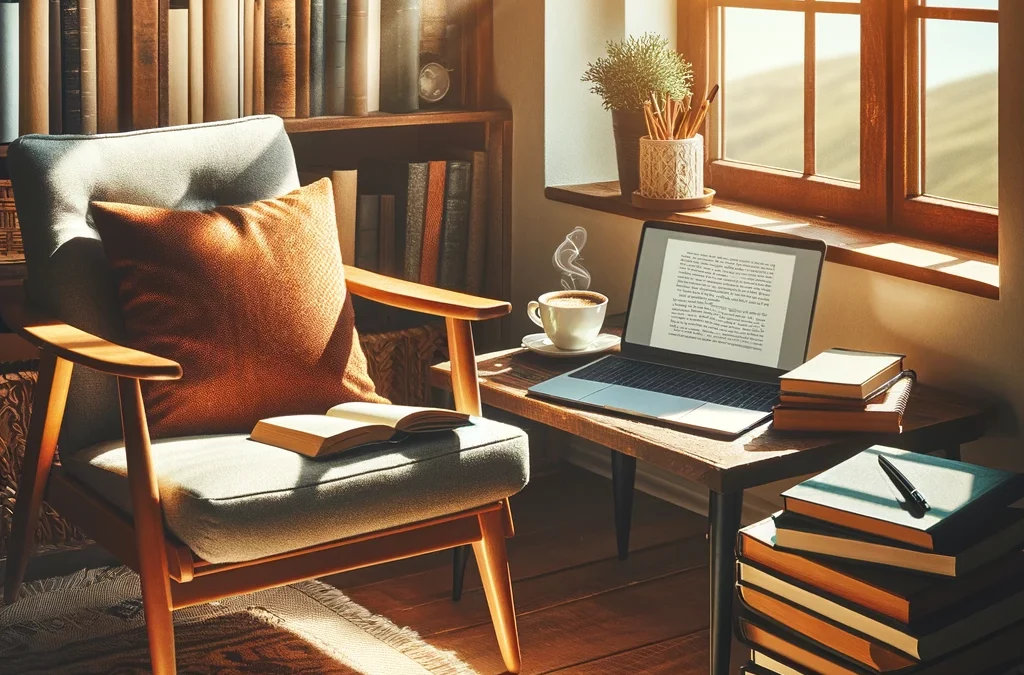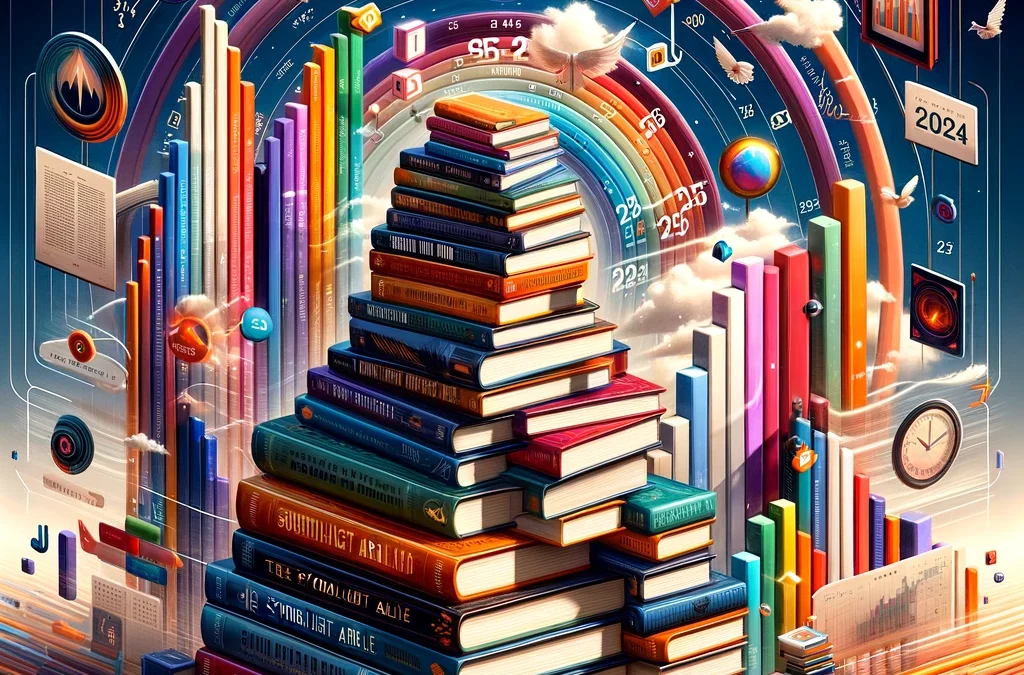
Feb 12, 2024
At the start of the year, I made a plan to read 75 books in 2024. It started off very well, but lately I’ve been struggling a bit and I had to sit down and think about whether this was really something I could do, or, more precisely, whether I should do it.
Here’s the thing: I love to read, but I am starting up a business and that takes a lot of time. When I sat down and worked it out, reading 75 books a year would take about an hour and a half of reading every day. Longer, if I wanted to listen to audiobooks as part of that. That’s around 10% of my total waking time spent reading, more if you take out the essential things that I have to do every day, whether or not I want to. Then it’s more like 70% of the time I have on any given day.
I’m not quite ready to give up on the goal, but it’s looking less doable now, because some of the time I have remaining after doing all the things I need to do each day might be better spent on things that could directly benefit my business, like writing a blog post, and fixing up my website.
75 books in a year was always an ambitious target for me. Currently, I am on track to read more like 52 books, which is still a book a week and much better than I managed in the last few years.

Jan 11, 2024
I haven’t set a reading goal before but over the last few years I have been struggling to read as much as I would like. There always seems to be other things I should be doing instead. Consequently, the number of books I have read has decreased year on year.
- 2015: 76
- 2016: 60
- 2018: 49
- 2019: 72
- 2020: 60
- 2021: 41
- 2022: 37
- 2023: 36
There are a number of reasons for that. Some of it was due to things happening in my life that left me with little mindspace to read. Some of it is due to the fact I read the first three Stormlight Archive books last year and each of those is over 1,000 pages long.
Regardless of the reasons, I decided that this year I want to read more. The goal I have set myself for it is 75 books. That’s the simple goal.
It gets more complicated though, because some books are long (Stormlight Archive) and some books are not so long and I don’t want to be able to manipulate the results by reading shorter books.
I figured that 100,000 words is a good length to make an average and worked off that number. I read both on my Kindle and audiobooks so a rough guess is that I average about 200 words a minute across those. So all I did then was work out how long it would take me to read 75 books and then broke that down to a daily goal of 1 hour and 45 minutes. If that ends up being more or less than 75 books it doesn’t matter, I will be happy having read that amount each day.
That was the plan. The start of the year didn’t work out quite how I planned and I am only now catching up to have an average of 1 hour and 45 minutes per day.
The goal is to read more and in order to hit that amount of time, I am having to read at times I didn’t used to. Times when I would have been on Reddit or wasting my time on something else. So this challenge is having an added benefit in making me spend less time on social media.
As of this morning, I have finished three books this year:
- A Deadly Education – Naomi Novik (2024-01-04 Thursday)
- How To Be A Stoic – Massimo Pigliucci (2024-01-08 Monday)
- The Last Graduate – Naomi Novik (2024-01-11 Thursday)
I am starting the last Deadly Education book now. If you haven’t read it yet, I highly recomend it. It’s very good.
Sep 20, 2023
My son Oscar is seven years old and just starting his reading career. Until now, most of the books he has read have been single-sitting stories. He’s an excellent reader though and at school they are getting him started on longer books with fewer pictures. However, since he went back to school at the start of the month, he has been carrying the same school book around with him and doesn’t make any progress on it.
This morning I asked him if he was enjoying the book and he admitted he wasn’t. So I told him to stop reading it and ask his teacher for another one.
When we are young, there are too many people who tell us we should finish every book that we start. I used to think that way as well. But it makes little sense. There are far more books in the world than anyone could read in a lifetime. You couldn’t even hope to read a fraction of the books that you might love in your life. So why waste time on stories that you don’t like?
I should really start keeping a list of all the books that I start and abandon. At a guess, it’s probably as long as the list of books that I finish.
As Oscar grows up, there are going to be books he has to read for school, which he won’t like very much. I remember brute-forcing my way through Tess of the d’Urbervilles at secondary school. If I never read another description of rolling fields, I will be happy. I then studied for an English Literature degree and there were plenty of books there that I didn’t enjoy, but read because I needed to for my course.
The school book Oscar is reading isn’t because he is going to have to write an essay about it. The book he is reading is not high literature, and it’s not because he finds it difficult that he’s not enjoying it. He is reading it for pleasure and for that purpose, there are plenty of other books he could read and enjoy.
So really, what I’m saying is give up on the books you don’t enjoy reading. Every book we read which we don’t enjoy, is one less book that we would enjoy.
Sep 18, 2023
I was born in 1983 and for more than half my life, reading books has meant paper. The first ebook reader I ever saw was in Waterstones book shop. It was one of the old Sony Reader ones, which means it can’t have been earlier than 2006 when they were released. Probably more like 2007. This was the first time I had seen an e-ink screen, and I was immediately interested. Unfortunately, I was a student at the time and the £500 that it would have cost to buy put it well outside of my price range.
The first ebook reader I owned was the Kindle Keyboard, which was the third-generation device, and the first at a price I could justify. Amazon released it in 2010, which means I would have been 27 years old when I started buying eBooks.
In the 13 years since I bought my first digital book, I have never not owned an eBook reader. Most of the time, that has been a Kindle, but I have also owned a Kobo and an Onyx Boox. They have always been e-ink devices.
I have bought paper books as well during that time, but reading that way no longer feels right. Although I love the aesthetics of a paper book, and I enjoy seeing them on my shelves, nothing can really beat the ease and convenience of reading an eBook.
Regardless of how many pages the book is, when it’s the eBook edition, it is comfortable to hold and read. I can carry around an epic fantasy novel with the same ease of a novella.
When I have tried going back to paper books (from time to time I get nostalgic for them) I have found I read much less. It’s difficult to hold a paper book open in one hand while stroking a cat. Paper books close themselves when putting them on the table to read while eating.
With a digital book, I can also read on my phone if I have forgotten to bring my eBook reader with me, or if I have been delayed unexpectedly somewhere. If I want to, I can buy the audiobook version as well and split my reading between audio and visual.
I have never been one to take notes in actual books. Something about writing in a book has always felt wrong to me. But I can do that with a digital book and not feel any sense of guilt. When I sync those notes and highlights up with a digital service like Obsidian, I can carry my book notes around wherever I am. As well as back them up, so I don’t have to worry about losing the book.
Last year I started wearing glasses for reading. With a digital book reader, I can adjust the size of the text so that I can still read myself to sleep without needing to wear them. That’s a convenience for me, but there are millions of people who need larger text books to read at all. With paper they are reliant on publishers putting out a large print edition, but with a digital reader they can make any book large print.
Digital books are not without their shortcomings. I have bought paper editions that feature illustrations, for example. But advances in color e-ink and increasing screen sizes of digital book readers are likely to eliminate those limitations in the next few years.
I also owe my career to digital books. While it’s now possible for independent creators to publish both paperback and hardback editions, it’s hard to imagine print-on-demand existing without the independent author movement being fueled by digital books.
I have nothing against paper books and expect to continue buying them from time to time. I will certainly continue publishing my own books on paper, because I love having a physical copy of them. But I love digital books most of all, and cannot foresee a time when they won’t be my primary reading method.


